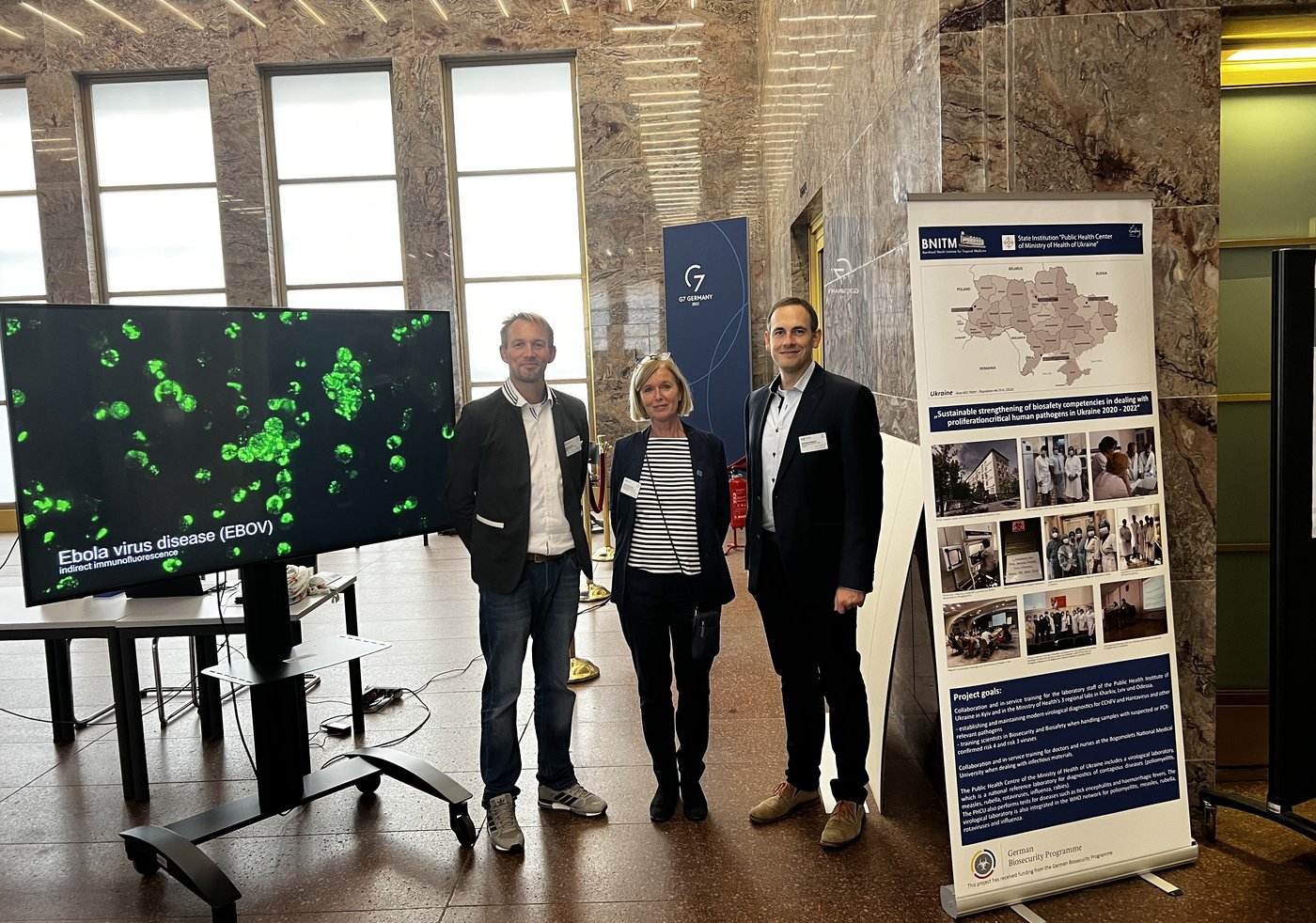Expanding capacities for non-proliferation and risk minimisation of proliferation-critical human pathogens in Ukraine 2023
Our working group has been on site in Ukraine since 2016 as part of the Federal Foreign Office's German Biosecurity Programme.
Various highly pathogenic pathogens for humans and animals occur naturally in Ukraine. The work of the biosecurity programme therefore enables Ukraine to detect and respond to unusual disease outbreaks at an early stage. In addition, the biosafety programme promotes the development of skills and the introduction of efficient procedures to strengthen laboratory safety.
This is what we do on site:
- Training of laboratory staff in biosafety and biosecurity and workshops in detection and diagnostics of highly pathogenic viruses to prevent the spread of these Improvement
- Theoretical and practical training of hospital staff on biosafety and biosecurity in handling infectious patient materials
- Implementation of serological and molecular genetic proficiency tests for CCHFV HNTV and MPOXV for quality assurance purposes
- Exchange of scientists
- Joint visits and presentations at national and international congresses

Our previous projects in Ukraine:
2016 - 2017 "Diagnostics and surveillance of Crimean-Congo haemorrhagic fever (CCHF) in Ukraine"
2018 - 2019 "Increasing biosecurity through improved diagnostics and seroprevalence studies of Crimean-Congo haemorrhagic fever (CCHF) and Hanta (HTN) viruses in Ukraine 2018-2019"
2020 - 2022 "Sustainable strengthening of biosafety competences in dealing with proliferation-critical human pathogens in Ukraine"
Our Partners:
Ministry of Health of Ukraine
Public Health Center of the MOH of Ukraine „PHCU“
State Institution “Lviv Oblast Center for diseases control and prevention of Ministry of the Ministry of Health of Ukraine”
State Institution “Kharkiv Oblast Center for diseases control and prevention of Ministry of the Ministry of Health of Ukraine”
State Institution „Ukrainian 1.1. Mechnikov Anti-Plague Research Institute of the Ministry of Health of Ukraine, Odessa“





![[Translate to English:] Logo_Alexander_von_Humboldt_Stiftung](/fileadmin/media/Allgemeines_und_Platzhalter/Logo/Logo_Alexander_von_Humboldt_Stiftung.png)
![Logo BMFTR [Translate to English:] Logo Bundesministerium fuer Bildung und Forschung](/fileadmin/media/Allgemeines_und_Platzhalter/Logo/BMFTR_de_Web_RGB_gef_durch_01.png)
![Logo BMG [Translate to English:] Logo Bundesministerium Fuer Gesundheit](/fileadmin/media/Allgemeines_und_Platzhalter/Logo/Logo_Bundesministerium_Fuer_Gesundheit.png)
![Logo Centre for Structural Systems Biology (CSSB) [Translate to English:] Logo CSSB](/fileadmin/media/Das_Institut/Kooperationen/CSSB_Logo_01.png)
![Logo Deutsche Forschungsgemeinschaft (DFG) [Translate to English:] Logo DFG](/fileadmin/media/Allgemeines_und_Platzhalter/Logo/Logo_DFG.png)
![Logo Deutsches Zentrum für Infektionsforschung (DZIF) [Translate to English:] Logo DZIF](/fileadmin/media/Das_Institut/Kooperationen/Logo_DZIF_01.png)
![[Translate to English:] Logo Emerge](/fileadmin/media/Allgemeines_und_Platzhalter/Logo/Logo_Emerge.png)
![[Translate to English:] Logo European Virus Archive goes global](/fileadmin/media/Allgemeines_und_Platzhalter/Logo/Logo_European_Virus_Archive_goes_global.png)
![Logo Federal Foreign Office [Translate to English:] Logo Federal Foreign Office](/fileadmin/media/Allgemeines_und_Platzhalter/Logo/Logo_Federal_Foreign_Office.png)
![Logo GHPP [Translate to English:] Logo GHP](/fileadmin/media/Allgemeines_und_Platzhalter/Logo/GHPP-Logo-RGB.png)
![[Translate to English:] Logo GPPEBHS](/fileadmin/media/Allgemeines_und_Platzhalter/Logo/Logo_GPPEBHS.png)
![[Translate to English:] Logo iNext](/fileadmin/media/Allgemeines_und_Platzhalter/Logo/Logo_iNext.png)
![Logo Jürgen Manchot Stiftung [Translate to English:] Logo Jürgen Manchot Stiftung](/fileadmin/media/Allgemeines_und_Platzhalter/Logo/Logo_Juergen_Manchot_Stiftung.png)
![Logo LCI [Translate to English:] Logo LCI](/fileadmin/media/Allgemeines_und_Platzhalter/Logo/Logo_LCI.png)
![Logo der Leibniz Gemeinschaft [Translate to English:] Logo Leibniz Gemeinschaft](/fileadmin/media/Das_Institut/Kooperationen/Logo_Leibniz_Gemeinschaft.png)
![[Translate to English:] Logo LFF Hamburg](/fileadmin/media/Allgemeines_und_Platzhalter/Logo/Logo_LFF_Hamburg.jpg)
![[Translate to English:] Logo Pandora](/fileadmin/media/Allgemeines_und_Platzhalter/Logo/Logo_PANDORA.png)
![[Translate to English:] [Translate to English:] Logo der Drugs for Neglected Diseases initiative, bestehend den aus drei orangefarbenen Großbuchstaben DND und einem kleinen i mit schwarzem Punkt.](/fileadmin/media/Allgemeines_und_Platzhalter/Logo/DNDi_Logo_EN_Full_Colour_margins.jpg)





